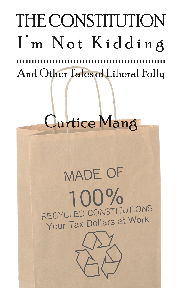
The Constitution (I’m Not Kidding) by Curtice Mang
 If you’re a fan of P.J. O’Rourke, you’ll probably get a chuckle out of this book by Phoenix area high school basketball coach Curtice Mang. Curtice was nice enough to send me a copy of his book. When (then) Speaker of the House Nancy Pelosi, the walking advertisement for Botox and plastic surgery, was asked by a reporter about the Constitutionality of the (misnamed) Affordable Health Care Act, and she replied incredulously, “Are you serious?†– twice. Hence the title of Mr. Mang’s book.
If you’re a fan of P.J. O’Rourke, you’ll probably get a chuckle out of this book by Phoenix area high school basketball coach Curtice Mang. Curtice was nice enough to send me a copy of his book. When (then) Speaker of the House Nancy Pelosi, the walking advertisement for Botox and plastic surgery, was asked by a reporter about the Constitutionality of the (misnamed) Affordable Health Care Act, and she replied incredulously, “Are you serious?†– twice. Hence the title of Mr. Mang’s book.
Despite the levity that Mang seeks to inject in the course of it’s the book’s mere 75 pages, The Constitution (I’m Not Kidding) is composed of 13 essays, the substance of which are serious indeed. It’s as though Mang had to laugh or cry – and he chose the former.
Mang diagnoses with the Left’s modus operandi at the onset of his book:
- A.) A perceived problem is identified;
- B.) Pass legislation addressing the perceived problem;
- C.) New legislation does not solve the perceived problem or creates new, unintended problem(s);
- D.) Repeat b and c.
In just about every subsequent essay, Mang demonstrates this sequence, using actual events. Mang’s sequence reminded this reader of Bastiat’s discourse on that which is seen and that which is not seen. In each chapter/essay, Mang attempts to make “that which is not seen†seen. For instance, in his chapter entitled The State Formerly Known as West Virginia, “that which is not seen†is actually hidden in plain sight. Mang explains,
Politicians like to advertise themselves. Actually, the business of politics is to promote oneself. What better advertisement than to have your name on half the buildings in the state? The other half, even in the State Formerly Known as West Virginia, is still privately owned. The good Senator Byrd could not complete the takeover of all property before his untimely death at ninety-two.
Mang then proceeds to explain the liberal proclivity to be generous with other people’s money.
Fundamental belief: Higher taxes are good, because they (liberals) don’t pay them.
In an example of “that which is not seen,†Mang recounts the consequences of the so-called “luxury tax†on yachts implemented by George Bush (of “read my lips†fame).
As yacht owners made practical decisions and decided to make do with what they had, yacht builders and yacht dealers had no market. The market in fact sank (pun intended). With no ready buyers, yacht builders went out of business. It turns out that they were not too big to fail. It may come as a surprise, but very few employees of these yacht-building companies were millionaires. I don’t think I’m far off to suggest that the number of millionaires formerly employed by the now-defunct yacht manufacturers was .. zero. Sometime later, in a rare instance where Congress admitted it blundered, the luxury tax was repealed.
In the chapter, Buddy, Do You Have Any Spare Climate Change, Mang provides another example of the Left’s modus operandi in action:
Ethanol is made from corn and purportedly pollutes less than carbon-based products like oil and gas. Require gas to contain 10 percent ethanol, and — oh, by the way — the feds will subsidize Iowa farmers to grow it. It’s another great scam: pay farmers to grow it and there is a ready-made federally mandated market for it. Except that it has, at times, led to food shortages. Huh? What? The corn grown for ethanol use is not the same corn grown for food. That’s true, but here’s where the government works its magic. If you subsidize a farmer to grow corn for ethanol, he will convert more of his acreage for that purpose and grow less corn for food consumption. Fortunately, government is ever ready to act. It agrees to subsidize farmers further now to grow more corn for food.
- A.) A perceived problem is identified (i.e., fossil fuels = global warming)
- B.) Pass legislation to address perceived problem (mandate that gas should contain an ethanol blend and provide for farm subsidies)
- C.) New legislation creates a new unintended consequence (food shortages)
- D.) Repeat b & c (subsidize farmers to grow more corn for food)
In subsequent chapters, Mang addresses things that a government shouldn’t do, citing solar energy, political civility, and the idiocy of Joe Biden, among other topics.
Mang’s book is clever but would be a whole lot funnier if it weren’t true. Unfortunately, many of us are just losing our sense of humor. Maybe Mang’s book can help restore it. On the other hand, ridicule can be very effective when pointing out the idiocy of the left.
 The posts are coming!
The posts are coming!


0 comments
Kick things off by filling out the form below.
Leave a Comment